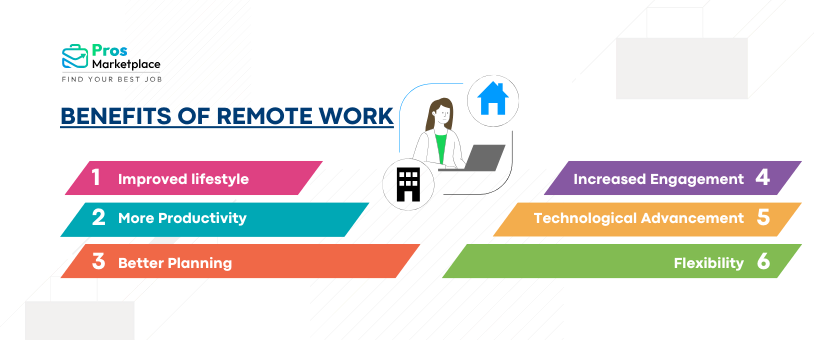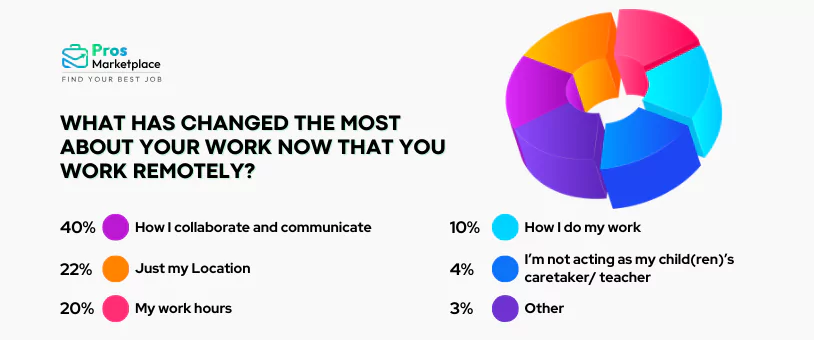Remote work is not a passing trend but a permanent change shift in how we work. The digital world permits us to connect and collaborate from anywhere we want. Remote work offers benefits that appeal to both employers and workers. Although the ability and freedom to work remotely are enticing. But it comes with some challenges too. Remote work can lead to a lack of boundaries and isolation. These factors require a call for attention.
Remote working became a big change during the pandemic. Once considered a short-lived benefit, it has now become standard for many professionals around the world. But the question remains: Will remote work be here for the long term? Why are some companies choosing to bring employees back to the office?
Let us explore its importance and the factors that make it a welcome change. Read below to know the pros and cons of remote work.
Is full-time remote work possible?
This question comes to the mind of people considering working remotely. Remote work has its appeal if you want to escape the daily grind. It is also helpful in completing tasks from the comfort of your home or any place of your choice. When you choose a remote role, it brings more freedom. However, it may not be suitable for every individual.
Before taking the next step, check the pros and cons of remote working. Remember, challenges are inevitable. So, before starting a remote role, understand its dynamics. This will help you build a sustainable career.

Pros of Remote Work
Carefully consider the pros and cons of remote work. This will help you make informed decisions and handle challenges effectively. Remote work presents both opportunities and challenges. These require thoughtful consideration.
So, before you make any decisions, weigh its pros and cons by reading below:
- Improved lifestyle:
Remote work has changed the way we work. It gives freedom from time constraints. This lets people spend time with their families. Consequently leading to a healthy work-life balance. It also helps in developing their careers.
Remote work also reduces lengthy commutes. This improves overall mental and physical health. It also offers a more streamlined work process. This can reduce stress and boost satisfaction in work and life.
- More Productivity:
Although it faced preliminary skepticism, remote work also benefits many businesses. Studies have found that employees are more focused and productive when working remotely.
This keeps them away from the distractions of a busy place of work. They can also devote more time to efficiency while not having to travel to a workplace every day. In addition, remote work permits workers to prepare their schedules effectively. It makes saving time and scheduling easier.
- Better Planning:
Working remotely reduces the challenges that slow down work. By not having to deal with commuting to work, employees can easily work at home and travel much less. Remote work also reduces distractions as it does not include any visits or transport delays. Therefore employees can plan their work hours accordingly. Remote work makes things easier and more eco-friendly. Additionally, it increases punctuality and worker self-assurance.
- Increased Engagement:
Confidence and independence are the leading motivations behind remote work. It encourages employees to be comfortable and committed. Employees who feel valued and trusted at work are likelier to work harder. Remote work makes growth and retention easier. It gives extra control over their work.
- Flexibility:
Working remotely also transcends time and region constraints. Remote employees can choose how and when they work. Whether from the comfort of home, from a shared office, or even while traveling. This alternative lets people build healthy lifestyles. This encourages a sense of independence. Moreover, remote work offers stability between work and personal obligations. This allows employees to balance their professional and personal duties.
- Technological Advancement:
The popularity of remote work has led companies to make advancements in virtual products. Companies are welcoming new technology to enhance collaboration and overall performance. These tools offer network security features and remote solutions. This enables effective communication and collaboration between remote employees. It also improves cybersecurity protocols for sensitive data.
Therefore keep up with the changing trends, to adapt to the needs of remote work. This will help you endure the increase in competition inside the virtual world.
Summary:
Pros of Remote Working:
- Eliminates the limitations of the traditional workplace
- Improve work-life balance, reduce working hours, and increase freedom of working hours. Increase productivity by minimizing distractions and creating your work environment.
- Cost savings for employees and facilities, including reduced travel, office, and utility costs.
- Flexibility to work from anywhere, decreasing the constraints of a traditional office setup.
- Increased productivity stemming from minimized distractions and a personalized work environment.

Cons of Remote Work
Remote work offers unparalleled flexibility. This makes it an excellent option for those seeking a better balance between work and personal life. However, it comes with some challenges. Overcoming these requires knowledge and a will to succeed. Exploring the challenges below make informed decisions when working remotely.
This also, makes it a good alternative for those seeking a better work-life balance. But overcoming the challenges needs in-depth understanding. Read below to understand the disadvantages of remote working:
- Face to Face Interactions
Face-to-face interaction fosters team bonding and cooperation to do the right work. In-person conversations allow effective verbal exchange and problem-fixing. Remote workers miss out on these social and expert views when operating remotely.
To mitigate this, collaborate online with colleagues. Chat sessions and video calls can keep them connected.
- Travel Costs:
While remote work often means working from home. But it may also require traveling to attend meetings or meet with clients. For example, consultants may find themselves frequently traveling to multiple locations. So when considering remote work, look at the travel obligations of the role. Set clear expectations regarding the travel contract and make sure how you fulfill these are communicated.
- Distance between work and home:
When home turns into work it blurs the lines between professional and personal life. This can make it difficult to separate work- and home-related responsibilities. It is important to analyze how the remote workplace affects one’s home environment. Use strategies such as creating an office and tracking work hours. They create a boundary between personal and professional life.
- Other Health Problems:
Remote working lets individuals break free from daily routine. But it can also lead to health problems. In remote work, travel and work-related physical activity are absent. When working from home unhealthy behaviors, such as sitting for long periods increases. Ergonomic office furniture and equipment are also absent which can cause discomfort and other problems. To reduce these prioritize regular physical activity. You can also invest in ergonomic workspace solutions, and improve physical health.
- Productivity:
Without supervision, remote workers may encounter distractions and temptations that hinder productivity. Family stress, lack of structure, and personal comfort can reduce focus and productivity. A lack of social interaction can slow down or foster bad habits. Remote workers should establish routines, reduce breaks, and use time management strategies. These help to create a healthy routine that increases productivity and is also good for your health.
- Delayed response time:
Long communication delays may cause failure to receive timely responses. Reliance on electronic communications means variable response times. This also leads to ineffectiveness or delays. Remote workers face more challenges collaborating with colleagues at different times. Therefore, establishing an open communication process is a must. Use tools to deal with delayed responses. This can help improve business performance.
- Mentorship
Mentors play an important role in professional development and career development. However, in remote work, there is a lack of immediate communication with managers and colleagues. This can limit feedback. Without regular face-to-face contact, remote workers face difficulty identifying areas for improvement. To overcome this challenge, remote workers need to receive feedback. This can be through regular check-ins and performance reviews. Virtual meetings drive growth and make this easier.
Summary:
Cons of remote working:
- Creates isolation and reduces team bonding.
- Difficulties in managing work-life boundaries.
- Reliance on technology, possible disruptions, or business problems.
- Limited access to training and professional training.
- Feelings of isolation.
- Dependency on technology and tools.
- Potential disruptions or technical issues.
- Limited access to mentorship and opportunities.
Conclusion
Remote work offers freedom. This makes it an attractive alternative for a better work-life balance. However, challenges in remote work call for attention. It requires work to overcome its pitfalls. We hope the above-mentioned pros and cons of remote work, help you handle the intricacies of remote work. This will also help you make better choices in remote work. So choose the right remote job and start applying for your dream remote roles!
However, you must understand the intricacies of remote working to address the challenges. You can efficiently handle these by gaining a deep understanding of the factors involved. We hope this blog will help you make informed decisions when seeking remote opportunities to pursue your desires and interests.
When you start working remotely keep your passions in focus. So choose a role that aligns with your career goals and personal values. Remember, with the right mindset and strategy, you can thrive in the world of remote work and launch a successful career from the comfort of your office.
Also Read: How to Stay Motivated Working From Home




